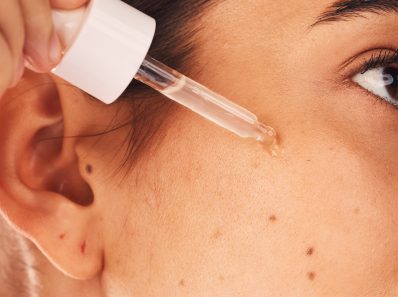We spoke to Chartered Chemist and Founder of SOS Serum Skincare, Bruce Green, on how having underlying diabetes can be linked to having dry skin.
“Diabetes often affects the skin due to high blood sugar levels. If your skin is drier than usual and you have diabetes, diabetes could be contributing to the cause of this effect on your skin. Skin problems which are more specific to people with diabetes include diabetic dermopathy, necrobiosis lipoidica diabeticorum, diabetic blisters, and eruptive xanthomatosis.
Diabetes can dry out your skin and cause itchiness and as a result, may mean you get injured more easily, are more likely to get an infection and it can take longer for wounds to heal.
To help manage diabetic skin:
Protect yourself from the Elements
To shield your skin from the cold or wind, cover your ears and face, including your nose, and wear a hat. Also, wear warm gloves and shoes or boots.
Keep Products Neutral
Wash with a mild, neutral soap and make sure that as well as rinsing you also dry yourself. This may include drying between your toes, under your arms, and anywhere else that water can hide. When you bathe or shower, use warm (not hot) water, and don’t stay in too long. Pat skin dry – don’t rub it when you get out, and apply moisturiser right away as this will prevent dry skin.

Moisturise Daily
Use a moisturising Lotion to keep you skin soft and moist. This type of cream is widely available and can make a huge difference. I recommend SOS Serum, £16, Shop — SOS SERUM SKINCARE. The key is to limit the products you use on your skin to lower your chances of having a reaction. I would also recommend using a lip balm to prevent chapped lips. Another good tip is to keep a bottle of lotion near the sink so you can use it after washing your hands.
Make a First-Aid Kit For Your Skin
Keep a first-aid kit close by to take care of your hands and feet. It should include Antibacterial ointment, Gauze pads, Hypoallergenic or paper tape, Pre-packaged cleansing wipes (in case soap and water aren’t available).
Water is Key
Keeping hydrated can help with keeping your skin moist and healthy. Aim for 8 glasses of water per day.
Increase Air Quality
To help prevent dry skin when the temperature drops, use a room humidifier to add moisture to heated indoor air.
Listen To Your Body
Keep a close eye on any dry or red spots on your skin and be ready to act by contacting your healthcare professional sooner rather than later. Keep an extra close eye on any areas affected by neuropathy and make sure to seek professional advice at an early stage. Seek medical advice if you have persistent dry skin as this can lead to infections, which can quickly develop into serious complications. If your skin problems worsen over time, see a doctor immediately.”



